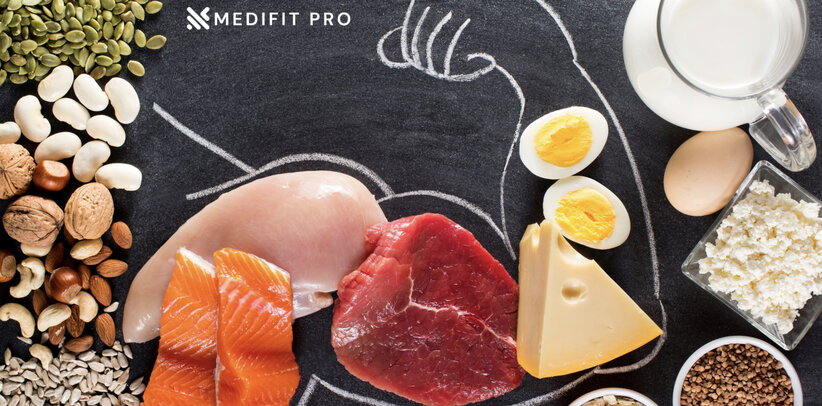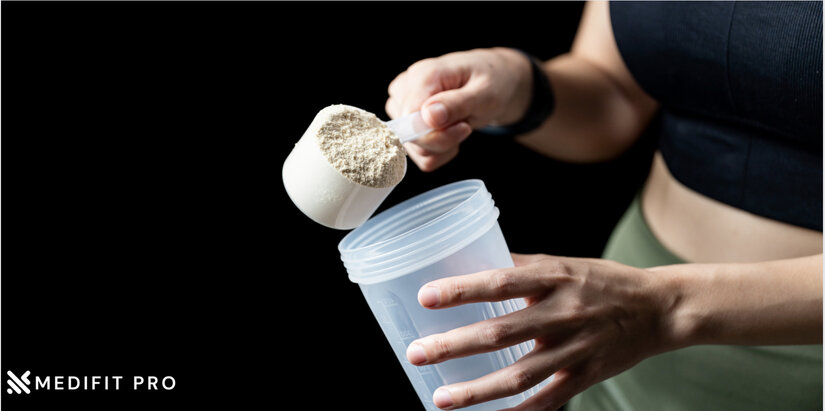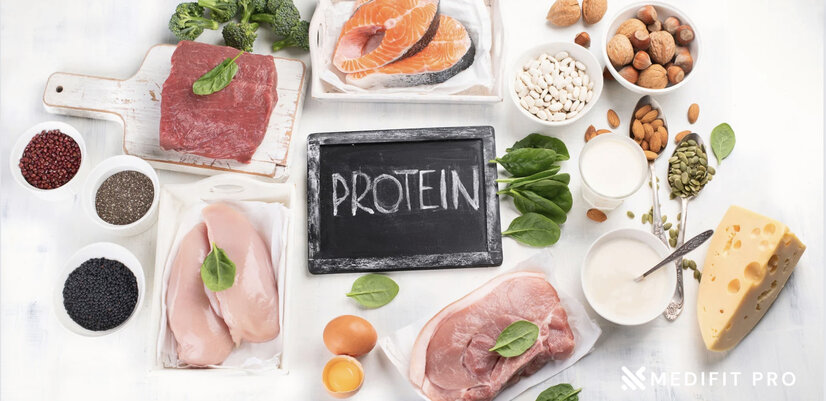Did you know that protein is the VIP of the nutrient world, especially when it comes to women’s health? This essential nutrient plays a crucial role in keeping your muscles strong, your hormones balanced, and your immune system functioning at its best. In this article, we’ll be delving deep into the world of protein and women’s health. So, buckle up and get ready to learn everything you need to know about how much protein women need for optimum muscle and overall health. We’ll explore the recommended daily protein intake for women, the amazing benefits of getting enough protein in your diet, the potential risks of consuming too much protein, and even the role of protein at different stages of a woman’s life. From superfoods to supplement recommendations, we’ve got all the juicy details. So, let’s get started and give protein the attention it deserves!
Protein and Muscle Building in Women
Ladies, it’s time to put down those puny dumbbells and pick up some serious weight. But before you hit the gym, you need to understand the crucial role that protein plays in building and maintaining muscle mass. In this section, we’ll explore the science behind how protein helps with muscle recovery after exercise, share some protein-rich foods that are particularly beneficial for muscle building, and discuss the importance of strength training for women’s health. Plus, we’ll dive into the details of how protein can support your strength training goals. So, let’s get ready to flex those muscles and power up with protein!
Role of Protein in Building and Maintaining Muscle Mass
Protein is the foundation for building muscle. When you exercise, you create tiny tears in your muscle fibers, which the body then repairs and rebuilds, resulting in stronger, more substantial muscles. To support this process, you need to provide your body with enough protein to fuel muscle growth and repair. Protein contains amino acids, the building blocks of muscle tissue. When you eat protein, your body breaks it down into amino acids and uses them to repair and rebuild your muscles. This is why protein is essential for building and maintaining muscle mass.
How Protein Helps with Muscle Recovery after Exercise
After you exercise, your muscles are depleted of glycogen, the primary source of fuel for muscles during activity. This is where protein comes in. Consuming protein after exercise helps to replenish glycogen stores and kickstarts the muscle recovery process. Additionally, protein can reduce muscle soreness and help prevent muscle breakdown. Aim to consume protein within 30 minutes to an hour after exercise to maximize its benefits.
Examples of Protein-Rich Foods That Are Particularly Beneficial for Muscle Building
Protein can be found in a wide variety of foods, but not all proteins are created equal. Some sources of protein are more beneficial for building muscle than others. Here are some examples of protein-rich foods that are particularly beneficial for muscle building:
• Lean meats such as chicken, turkey, and beef
• Fish such as salmon, tuna, and mackerel
• Eggs
• Greek yogurt
• Cottage cheese
• Beans and legumes
• Nuts and seeds

The Importance of Strength Training for Women’s Health
Strength training is often associated with bulky, masculine physiques. However, this couldn’t be further from the truth. In reality, strength training is one of the best things women can do for their health. It helps to build and maintain muscle mass, boost metabolism, improve bone density, and reduce the risk of injury. Strength training can also improve mental health and boost self-esteem. So, don’t be afraid to lift some heavy weights!
The Role of Protein in Supporting Strength Training Goals
To support your strength training goals, you need to consume enough protein to fuel muscle growth and repair. The American College of Sports Medicine recommends that active individuals consume between 1.2 and 1.7 grams of protein per kilogram of body weight per day. However, some studies suggest that even higher protein intakes may be beneficial for building muscle. In addition to whole food sources of protein, protein supplements such as whey protein powder can be a convenient and effective way to meet your daily protein needs. Just be sure to choose a high-quality, reputable brand.
Recommended Daily Protein Intake for Women
The recommended daily protein intake for women varies based on several factors, including age, activity level, and body weight.
According to the Institute of Medicine, the recommended dietary allowance (RDA) for protein is 0.8 grams per kilogram of body weight per day for adults. However, this value is a general recommendation and does not consider individual differences. For instance, women who engage in regular physical activity, especially strength training, may require more protein to support muscle recovery and growth.
Age is also a significant factor that affects a woman’s protein needs. As women age, they tend to lose muscle mass, which can lead to several health problems. Research suggests that older women may benefit from consuming more protein to maintain muscle mass and function. Additionally, women who are pregnant or breastfeeding require more protein to support fetal and infant growth and development.
Body weight is another important consideration when determining protein needs. Generally, the heavier the individual, the more protein they require. This is because muscle mass is closely related to body weight. Therefore, women who have a higher body weight or who are trying to build muscle may need to consume more protein than those who weigh less.
In terms of specific protein intake recommendations, there is no one-size-fits-all answer. However, research suggests that consuming 1.2-1.6 grams of protein per kilogram of body weight per day may be optimal for muscle building and overall health in physically active women. This equates to approximately 90-120 grams of protein per day for a woman who weighs 150 pounds.
Consuming too little protein can have negative consequences on health, including muscle loss, decreased immune function, and an increased risk of bone fractures. Therefore, it is essential to consume adequate amounts of protein to support overall health and wellbeing.
Benefits of Adequate Protein Intake for Women
Improved Bone Health
One of the critical roles of protein in women’s health is maintaining bone health. Research suggests that protein intake is positively associated with bone mineral density, a measure of bone strength. A diet rich in protein can also reduce the risk of fractures and osteoporosis, a condition characterized by weak and brittle bones.
Increased Metabolism and Weight Loss
Protein intake can also increase metabolism, which is the rate at which the body burns calories. This is because protein has a higher thermic effect than carbohydrates or fats, meaning that the body expends more energy digesting and processing it. Consequently, consuming protein can help women burn more calories at rest, which may aid in weight loss or weight management goals.
Increased Satiety and Weight Management
Another benefit of protein consumption is that it can help women feel fuller for longer periods, which can help with weight loss or weight management. Research suggests that protein has a higher satiating effect than carbohydrates or fats, meaning that it can help reduce hunger and increase feelings of fullness. Therefore, consuming protein-rich foods can help women reduce calorie intake and manage weight.
Enhanced Exercise Performance and Recovery
Protein consumption before and after exercise can also enhance exercise performance and recovery. Consuming protein before exercise can provide the body with the necessary amino acids for muscle building and repair. Additionally, consuming protein after exercise can help with muscle recovery, reducing muscle soreness, and preventing muscle breakdown.
Enhanced Muscle Growth
Aside from its role in muscle recovery, consuming protein after exercise can also promote muscle growth. Exercise stimulates muscle protein synthesis, the process by which the body builds new muscle proteins. Consuming protein after exercise can enhance muscle protein synthesis, resulting in increased muscle growth over time.
Better Immune Function
Finally, protein intake can also improve immune function. The immune system relies on several amino acids to produce immune cells and antibodies that protect the body against pathogens. A diet deficient in protein can result in a weakened immune system, making individuals more susceptible to infections and illnesses.
Potential Risks of Consuming Too Much Protein
While protein is essential for overall health, excessive protein intake can have potential risks associated with it. Here are some of the potential risks:
1. Kidney Damage
Excessive protein intake can increase the workload on the kidneys, leading to kidney damage and impaired kidney function. The kidneys are responsible for filtering waste products and excess fluids from the blood, and high protein intake can cause the kidneys to work harder to eliminate the waste products created when protein is broken down. This can lead to long-term kidney damage and impaired kidney function. Individuals with pre-existing kidney problems or high blood pressure may be at greater risk of kidney damage from excessive protein intake.
2. Liver Problems
Excessive protein intake can lead to liver damage and impair liver function. The liver is responsible for breaking down and processing the protein we consume, and high protein intake can cause the liver to work harder to break down and process the protein. This can lead to long-term liver damage and impaired liver function. This risk is more significant for individuals with pre-existing liver problems or those consuming high amounts of animal protein, which can contain high levels of saturated fat and cholesterol that can contribute to liver damage.
3. Increased Risk of Certain Types of Cancer
High intake of animal protein, particularly red and processed meat, has been associated with an increased risk of colon and breast cancer. This risk may be due to the production of carcinogenic compounds during the cooking process, such as heterocyclic amines and polycyclic aromatic hydrocarbons. These compounds are created when animal protein is cooked at high temperatures, such as grilling, broiling, or frying.
Tips to Achieve a Balanced Protein Intake
Make sure to have adequate protein intake while avoiding the potential risks of overconsumption. Here are some tips to achieve a balanced protein intake:
1. Choose a variety of protein sources, including plant-based sources such as legumes, nuts, and seeds, as well as animal-based sources such as lean meats, fish, and eggs. Plant-based protein sources are generally lower in saturated fat and cholesterol and may have additional health benefits such as fiber and phytochemicals.
2. Monitor protein intake and adjust accordingly based on individual needs and goals. The recommended daily protein intake for women is 0.8 grams of protein per kilogram of body weight. However, individual needs may vary based on age, activity level, and other factors.
3. Plan your meals: Take some time to plan out your meals for the week, including snacks. This will help you ensure that you are getting enough protein in your diet and also help you avoid reaching for less healthy options when hunger strikes.
4. Incorporate protein into every meal: Make sure you are incorporating protein into every meal. For example, have some scrambled eggs or Greek yogurt with breakfast, a chicken breast or tofu stir-fry for lunch, and grilled fish or lentils with vegetables for dinner.
5. Be mindful of portion sizes: While protein is important, it’s also important to be mindful of portion sizes. Eating too much protein can have negative health consequences. Aim for a serving size of 3-4 ounces of protein at each meal.
6. Consider protein supplements: If you’re struggling to meet your protein needs through food alone, protein supplements such as whey protein powder or plant-based protein powders can be a helpful addition to your diet.
7. Experiment with new protein sources: Don’t be afraid to try new protein sources such as tempeh, seitan, or quinoa. Incorporating a variety of protein sources into your diet can help ensure that you are getting all the essential amino acids your body needs.
8. Consult a healthcare professional or registered dietitian to develop a personalized nutrition plan that meets individual needs and goals. They can help to assess individual protein needs, ensure that protein intake is adequate but not excessive, and identify potential protein sources that fit into a balanced diet.
By following these tips, you can ensure that you are getting enough protein in your diet to support muscle building, overall health, and wellness
Summary points
• Protein is crucial for women’s muscle building and overall health
• Recommended daily protein intake for women varies based on factors like age, activity level, and body weight
• Adequate protein intake supports muscle growth and recovery, and has numerous health benefits including improved bone health, increased metabolism, and better immune function
• Consuming protein before and after exercise can also have benefits for muscle recovery and growth
• It’s important to be mindful of the potential risks of consuming too much protein, including kidney damage, liver problems, and increased risk of certain types of cancer
• To ensure adequate protein intake while avoiding potential risks, it’s important to consume a variety of protein sources and be mindful of portion sizes
• Tips for incorporating protein-rich foods into your diet include planning your meals, incorporating protein into every meal, considering protein supplements, and experimenting with new protein sources.
By following these guidelines, women can ensure that they are getting the protein their body needs to thrive and achieve their health and fitness goals.
Also read How to Stay Motivated for Exercise
Reference
- Academy of Nutrition and Dietetics: https://www.eatrightpro.org/



























Recent Comments